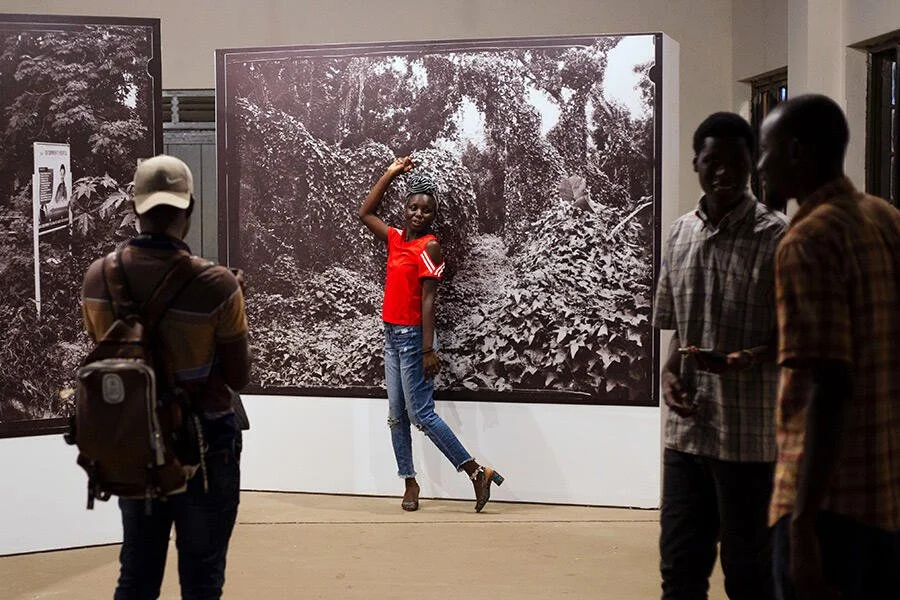‘Tracing Emerging Ecology’, 2022, exhibition view. Courtesy: Nuku Studio; photograph: Fibi Afloe
By basing themselves outside of Accra, Nuku Studio provides space and time for Ghanaian and international photographers to develop their craft
Photography has been a key art form in West Africa since it was introduced to the region in the late 19th century. Soon afterwards, studios began to appear in major cities from Freetown to Monrovia, with Accra no exception: Deo Gratias, established in the Ghanaian capital in 1922 by J.K. Bruce-Vanderpuije, is still running today. Someone with a keen interest in this history is photographer Nii Obodai, currently based between Ghana and Zimbabwe, who, for more than two decades, has looked to these studios’ collections to inform his own photographic practice.
In 1998, in response to a growing need for structures of support for emerging photographers in Accra, Obodai co-founded the art space Nuku Cafe. He also set up a library in his own home filled with hard-to-access books on photographic theory to encourage the informal, salon-style conversations about artistic practice springing up across the city. Two decades later, with the support of Dutch entrepreneur Henri Wientjes, Obodai launched Nuku Studio Centre for Photographic Research and Practice in the northern city of Tamale. This coincided with the first edition of Nuku Festival, curated by Obodai and a team of fellow practitioners, including photojournalist Francis Kokoroko and photographer Eric Gyamfi.
After shutting its doors temporarily due to the COVID-19 pandemic, the centre has staged three exhibitions since it reopened in late 2022. The first, ‘Gold Matters’, focused on sustainable gold mining within the fraught political context in Ghana of widespread galamsey (illegal mining). The exhibition was the culmination of a project with a host of partners, including Leiden University, the Nordic Africa Institute and the Centre for Responsible Mining at the University of São Paulo. Subsequent shows, such as ‘Tracing Emerging Ecologies’ (2022), have sought to interrogate photographic responses to ecological debate and the climate crisis. In collaboration with the Dutch photography organization Nooderlicht, Nuku has also been documenting the region as part of the project ‘Northern Ghana Life’ (2016–ongoing). Nuku’s remit is to use photography as a catalyst for social change, in an attempt to replicate the methods of studios such as Deo Gratias by creating bodies of work that will one day act as archival records of their time. Nuku showcases a wide range of practices, from photojournalism (Obodai has collaborated with World Press Photo on several occasions) to more experimental forms of engagement with the medium – combining analogue film-processing techniques and research-based approaches, for instance, to offer poetic responses to socio-political issues.
During a recent phone call, I asked Obodai why he had decided to set up his space in Tamale as opposed to Accra, where considerable international attention has been focused in recent years. ‘If we’re looking at the big picture, we can’t all be centralized,’ he replied. ‘Not to mention that maintaining an organization in Accra is expensive.’ By moving further north to benefit from cheaper running costs, Nuku has been able to secure a second building to house the participants of their Nuku residency programme – at present, photographers Fibi Afloe and Amelie Koerbs. ‘It’s a five-bedroom house,’ Obodai told me. ‘Imagine how much that would cost to rent in Accra?’ As is typical of most Ghanaian arts organizations, Nuku has to be creative in terms of continuing to support itself due to a lack of state funding.
Obodai has a clear vision for Nuku’s future, which is equal parts pragmatic and ambitious. The aim is to expand the residency programme to provide long-term support to both established Ghanaian artists and international photographers, as well as offering month-long workshops – recruited via open call – to equip those at the beginning of their careers with basic photographic skills. By keeping overheads low, the centre can focus on nurturing an engaged community of artists and collaborators. Nuku is also working with local farmers and agriculturalists to support the development of a seed bank on their vast expanse of land to help counter the loss of indigenous crops due to deforestation. The centre will help with both collecting seeds and creating visual documentation of the project, as part of their ongoing ‘Living Archive’ research. ‘We can make beautiful photographs,’ Obodai tells me, ‘but the aim is to make photographs which are useful to society.’
This article by Vanessa Peterson first appeared in frieze issue 236 as part of a dossier with the headline ‘Ghana: Four Galleries to Watch’, alongside Gallery 1957, Nubuke Foundation and Savannah Centre for Contemporary Art, and can also be accessed on the frieze website.

